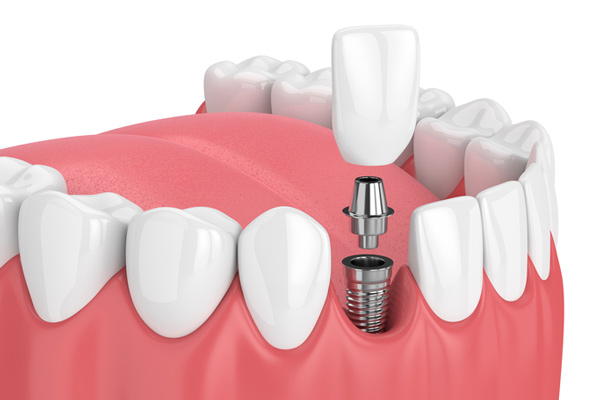Types of Dental Implants in Roswell, GA Dental implants have emerged as a revolutionary solution for individuals seeking a permanent and natural-looking way to replace missing teeth and restore dental health. Dental implants have emerged as a revolutionary solution for individuals seeking a permanent and natural-looking way to replace missing teeth and restore dental health. Dental implants at Reich Dental Center – Roswell come in various types, each designed to address specific dental needs. What are the different types of dental implants?Endosteal ImplantsEndosteal implants are the most common type of dental implants, surgically placed into the jaw bone. Endosteal implants consist of small screws, cylinders, or blades, providing a sturdy foundation for artificial teeth. Subperiosteal ImplantsSubperiosteal implants are positioned on top of the jaw bone but beneath the gum tissue. They consist of a metal framework that protrudes through the gums to hold the artificial tooth or teeth in place. Factors to Consider for Dental ImplantsSeveral factors influence the success and suitability of dental implants. First, sufficient bone density is crucial for the successful integration of implants. If the jaw bone lacks density, we may recommend bone grafting before implant placement. General health conditions, such as diabetes and autoimmune disorders, can impact the healing process. It's essential for individuals considering implants to have good overall health. Smoking is not recommended prior to implant surgery as it can impede the healing process. Oral health is equally important. Healthy gums and proper oral hygiene are essential for the long-term success of dental implants. Regular dental check-ups and maintenance are crucial. Eligibility and CandidacyNot everyone is an ideal candidate for dental implants. Implants are generally suitable for adults once their jaw bone has fully developed. There is no upper age limit for implant placement. Candidacy also depends on oral health and overall health. Certain medical conditions, such as uncontrolled diabetes, may impact the success of implants. A thorough medical history is considered during the evaluation. Cost of Dental ImplantsThe cost of dental implants can vary based on factors like the type of implant, the number of implants needed, and any additional procedures required, such as bone grafting. While dental implants may have a higher upfront cost compared to other options for replacement teeth, their long-term benefits often outweigh the initial investment. Procedure and RecoveryThe process of getting dental implants typically involves several stages, beginning with a comprehensive examination, which includes imaging studies. [[[divstyle:padding-left:25px;|
Benefits of Dental ImplantsDental implants offer a multitude of benefits that contribute to their widespread popularity.
FAQs about Dental ImplantsAre dental implants permanent?Yes, dental implants are designed as permanent replacement teeth. Unlike traditional bridges or dentures that may require periodic adjustments or replacements, dental implants, with proper care and maintenance, can last a lifetime. The key to their longevity lies in the process of osseointegration, where the implant fuses with the jaw bone, providing a stable and durable foundation for the artificial tooth or crown. How long does the dental implant procedure take?The duration of the initial planning phase depends on the extent of preparatory work needed. The surgical procedure to place the implant into the jaw bone usually takes one to two hours per implant. Osseointegration takes from several weeks to months. Attaching the abutment to the implant and the placement of the final artificial tooth or crown typically requires one or two appointments. In total, the entire process can take several months, with the majority of the time devoted to allowing the implant to integrate with the jaw bone. Do dental implants look and feel natural?One of the significant advantages of dental implants is their ability to closely mimic the appearance and feel of natural teeth. The artificial tooth or crown is custom-designed to match the color, shape, and size of surrounding teeth, ensuring a seamless integration into the smile. In addition, because implants are anchored in the jaw bone, they provide the same stability and functionality as natural teeth. Patients often report that dental implants feel so natural that they forget they have them. Are there any age restrictions for dental implants?There is generally no upper age limit for dental implants. The eligibility for dental implants is more dependent on overall health and bone density than age. As long as an individual is in good health and has sufficient jaw bone density to support the implant, age is not a prohibitive factor. In fact, dental implants are successfully placed in older adults, providing them with a durable and functional solution for missing teeth. It's important to note that children are not typically candidates for dental implants until their jaw bone has fully developed. The decision to proceed with dental implants is based on a thorough assessment by the dental professional, considering various health factors and individual circumstances. Schedule Dental Implants with Your Roswell Dentist Today!Dental implants offer a permanent, natural-looking solution for individuals seeking to restore missing teeth. With their ability to closely replicate the appearance and function of remaining teeth, dental implants provide not only a cosmetic enhancement but also a durable and long-lasting option for replacement teeth. Call us today at 770-992-3353 to schedule a consultation! |
|
|
Reich Dental Center – RoswellRobin Reich, DDS | Stacey Wingad, DMD | Megan Reich Rihan, DMD Andrea Vita, DMD Call or Text: 770-992-33531775 Woodstock Rd, Suite 350 Roswell, GA 30075
|